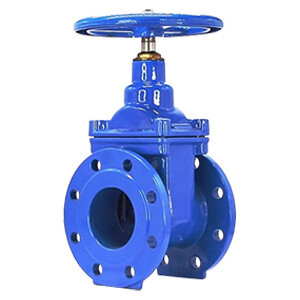

Tel: +86-532-66952179/66952180
Fax: +86-532-66952181
E-mail:info@qdiflow.com
Sales office address: Unit 1517-1520, Building 4, Excellence Century Center, No. 31 Longcheng Road Qingdao, China.
Factory address: No.15, Jinshajiang Road, Tongji Street, Jimo District, Qingdao,China
What is a Gate Valve
A gate valve operates by moving a wedge-shaped gate up or down to control fluid flow. When the valve is fully open, the gate is completely lifted, allowing for unrestricted fluid passage. When closed, the gate seals tightly against the valve body, stopping the flow. The design of a gate valve enables a straight-line flow, minimizing resistance and pressure drop, which is why they are ideal for applications requiring full flow.

Gate Valves in the Oil and Gas Industry
The oil and gas industry relies heavily on gate valves due to their durability, high-pressure resistance, and reliable shut-off capabilities.
Pipeline Systems: Gate valves are used to isolate sections of pipelines for maintenance or emergency shutdowns. Their ability to fully open and allow for minimal flow restriction makes them ideal for long-distance transportation of oil and gas.
Offshore and Subsea Operations: Offshore platforms often use gate valves for their reliability in harsh environments and their ability to handle extreme pressures. These valves can also be used in subsea pipelines for effective shut-off when required.
Refineries: In refineries, gate valves are used to control the flow of hydrocarbons during the refining process. Their ability to perform in high-temperature and high-pressure environments ensures smooth operations while preventing leaks and spills.
Gate Valves in Water Treatment
In water treatment plants, gate valves are essential for controlling the flow of water, whether it's raw, treated, or recycled water. They are especially useful in large-scale systems due to their ability to provide full flow with minimal resistance.
Flow Isolation: Gate valves are commonly used to isolate pipelines, tanks, and other equipment during maintenance or repairs, ensuring that the system can continue to function smoothly without disrupting the overall process.
Reservoirs and Storage Tanks: They are also used to control water flow to and from reservoirs and storage tanks, enabling operators to manage water levels and prevent overflow or contamination.
Efficient Distribution: Because gate valves have low flow resistance when open, they allow for efficient water distribution throughout the treatment plant, which helps optimize energy usage in pumping systems.
Gate Valves in the HVAC Industry
The HVAC (Heating, Ventilation, and Air Conditioning) industry makes extensive use of gate valves in heating and cooling systems. These valves are crucial in regulating the flow of fluids, such as hot water or refrigerants, through pipes.
Flow Regulation: Gate valves are used in HVAC systems to control the flow of hot and cold water, ensuring that the temperature in a building is maintained at a comfortable level. Their ability to provide tight shut-off is essential in systems where temperature control is critical.
Isolation of Sections: When maintenance is required, gate valves can isolate specific parts of the system, preventing the entire HVAC system from being shut down. This reduces system downtime and improves operational efficiency.
Energy Efficiency: By ensuring minimal pressure drop during operation, gate valves help HVAC systems run more efficiently, which can reduce energy consumption and operational costs.
Gate Valves in Chemical and Pharmaceutical Industries
In both the chemical and pharmaceutical industries, gate valves are used in systems that transport liquids, chemicals, or even slurries. These industries require valves that can handle highly corrosive substances and extreme operating conditions.
Flow Control for Chemical Reactions: Gate valves help control the flow of chemicals in reactors, ensuring precise mixing and preventing hazardous overflows or leaks. Their tight shut-off capability is crucial in preventing chemical spills.
Pharmaceutical Production: In pharmaceutical plants, gate valves are used to control the flow of liquids and powders during the production of medicines and drugs. Given the importance of maintaining sterile environments, gate valves offer leak-proof sealing, which is vital for maintaining the integrity of the process.
Corrosion-Resistant Materials: Gate valves used in these industries are typically made from materials like stainless steel or special alloys that are resistant to corrosion, which ensures their longevity and performance even when exposed to harsh chemicals.
Gate Valves in Power Generation
The power generation industry uses gate valves in both fossil fuel and nuclear plants to manage the flow of steam, water, and gases throughout the system.
High-Pressure and High-Temperature Service: Gate valves are essential in regulating steam flow in power plants, especially in boiler and turbine systems, where high-pressure and high-temperature conditions prevail. Their ability to handle these extreme conditions makes them a staple in the industry.
Shut-Off Capabilities: Gate valves are often used to shut off steam flow for safety during maintenance or in case of emergencies. Their full closure ensures no leakage, which is critical in preventing accidents or system malfunctions.
Operational Safety: Gate valves provide effective isolation to prevent backflow, protecting turbines and boilers from potential damage and maintaining operational safety.
Gate Valves in Mining and Industrial Applications
The mining and heavy industry sectors use gate valves to control the flow of water, slurry, or gases in their operations.
Slurry Control: Mining operations often require valves capable of handling slurries, which are mixtures of water and fine particles. Gate valves are effective in controlling the flow of slurry through the system, minimizing wear and tear on the equipment.
Fluid Transport: In industrial processes, gate valves control the flow of fluids such as oils, solvents, and gases. Their design ensures that they can withstand harsh conditions without compromising system integrity.
High Flow Demand: These industries require valves that can handle large volumes of fluid quickly, which is where gate valves excel. Their ability to provide full flow with low resistance is a key benefit.